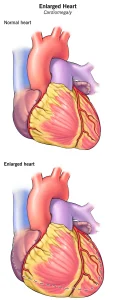Overview
An enlarged heart, medically referred to as cardiomegaly, is a condition in which the heart becomes larger than normal. This enlargement usually occurs because the heart muscle has to work harder to pump blood effectively. An enlarged heart is not a disease itself but a sign of an underlying heart or systemic condition. Depending on the cause and severity, it may be temporary or progressive and can affect the heart’s ability to function properly.
Symptoms
Some people with an enlarged heart may not experience symptoms in the early stages. When symptoms do occur, they may include:
-
Shortness of breath, especially during activity or while lying down
-
Fatigue and weakness
-
Swelling in the legs, ankles, or abdomen
-
Rapid or irregular heartbeat
-
Chest discomfort or pressure
-
Dizziness or fainting episodes
Worsening or sudden symptoms require immediate medical evaluation.
Causes
An enlarged heart develops when conditions place extra strain on the heart muscle or damage it. Common causes include:
-
High blood pressure that forces the heart to pump harder
-
Coronary artery disease and previous heart attacks
-
Cardiomyopathy affecting heart muscle strength
-
Heart valve disorders
-
Congenital heart defects
-
Chronic lung diseases causing increased pressure on the heart
-
Severe anemia or thyroid disorders
-
Excessive alcohol use or certain infections
Identifying the underlying cause is essential for effective treatment.
Risk Factors
Several factors increase the risk of developing an enlarged heart:
-
Long-standing high blood pressure
-
Family history of heart disease or cardiomyopathy
-
Diabetes and obesity
-
Smoking and sedentary lifestyle
-
Excessive alcohol consumption
-
Chronic kidney or lung disease
-
Advancing age
Managing risk factors early can reduce strain on the heart.
Complications
If left untreated, an enlarged heart can lead to serious complications:
-
Heart failure due to reduced pumping ability
-
Blood clots that may cause stroke or pulmonary embolism
-
Abnormal heart rhythms that can be life-threatening
-
Sudden cardiac arrest in severe cases
-
Progressive decline in physical capacity and quality of life
Early diagnosis significantly lowers the risk of complications.
Prevention
Not all causes of an enlarged heart can be prevented, but heart-healthy habits can reduce risk:
-
Maintaining normal blood pressure and cholesterol levels
-
Following a balanced, low-sodium diet
-
Engaging in regular physical activity
-
Avoiding smoking and limiting alcohol intake
-
Managing diabetes and other chronic conditions
-
Attending regular health checkups for early detection
Proactive cardiovascular care plays a vital role in preventing heart enlargement and its consequences.
Advertisement

